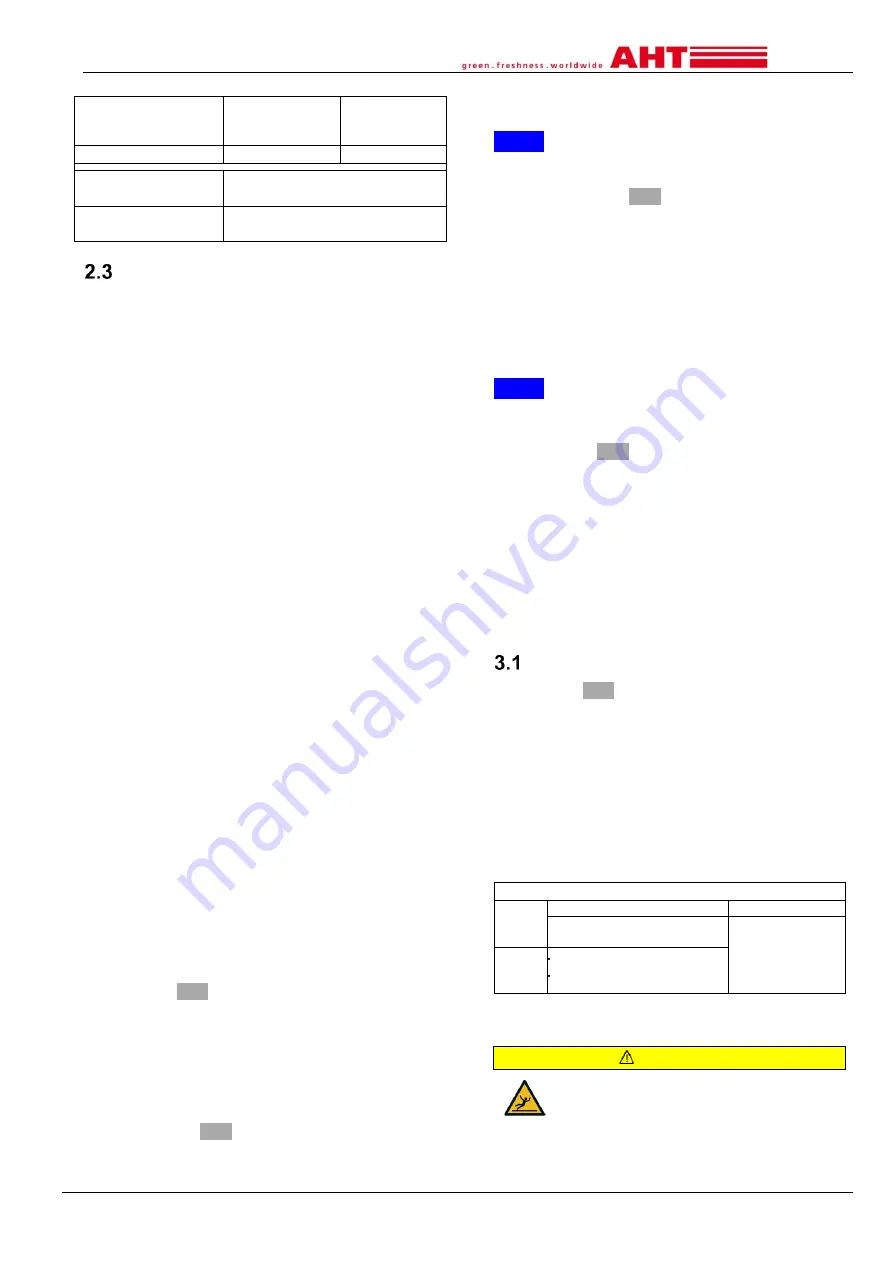
AHT Cooling Systems GmbH
on21.05.2018 21:36
Page 41
361929_0917_BA_SM_V4_06.09.2017_U_enUS_CD.docx
Climate class
according to ISO
23953-2
Ambient
temperature
[°C]
Relative
humidity
[%]
3
25
60
Classification
according to
NSF 7
Ambient temperature
Type I display
refrigerator
≤ 75 °F (24 °C)
Intended use
Devices with operating mode
Deep-freezing
“-” are
intended for the storage of packaged deep-frozen
food products.
Devices with operating mode
Cooling
“+” are
intended for the storage of packaged cooled food
products.
Devices with operating mode
Meat cooling
“S” are
intended for the storage of packaged cooled food
products especially for meat products (e.g.: minced
meat).
For additional information, see
→
Chapter 1.3
3 Layout and function
The device is a compact device ready to plug in.
All individual devices are delivered ready for
operation and have their own control unit.
The devices are pre-programmed at the factory.
Each device contains one or more hermetically
closed refrigerant circuits, the components of which
are technically connected to each other permanently.
The design of the individual device models can vary.
Device series:
Devices from the series (-) are designed for the deep-
freezing “-” operating mode.
Devices from the series (S) are designed for the meat
cooling “S” operating mode.
With universal devices (U), you can choose between
3 operating modes: Deep-
freezing “-”, Meat cooling
“S” and Cooling “+”.
With universal devices (V), you can choose between
2 operating modes: Deep-
freezing “-” and Cooling
“+”.
The switching between the operating modes is
carried out via a controller (see
→
Chapter
4.2.1/4.2.2.2/4.2.3.2).
The waste heat generated in the device is discharged
to the ambient air via a liquefier.
Devices
with
(AD)
function defrost automatically at
regular intervals (see
→
Chapter 3.1). In addition, a
semi-automatic defrosting (see
→
Chapter 4.2.2.4/
4.2.3.4) can be started by the operating company.
For devices with operating mode
cooling (“+”, “S”),
the automatic defrosting can be set to inactive ex-
factory.
Devices
without
(AD)
function do not have any
automatic defrosting.
The operating company must carry out a complete
defrosting (see
→
Chapter 10.1.1).
NOTE
•
Material and property damage
due to the
formation of ice on the cooling surfaces.
►
Devices without
(AD)
function must be defrosted
completely manually by the operating company at
regular intervals (complete defrosting).
For hygienic reasons, a complete defrosting (see
→
Chapter 10.1.1) with subsequent cleaning must be
carried out on all devices.
Depending on the device model, an individual inner
area design (wall grille, air ducts, floor grille, partition
wall grille, upright baskets) is possible.
NOTE
•
Property damage
caused by missing interior
equipment.
►
Devices with
(AD)
function may only be operated
with wall grille.
►
Devices for meat cooling “S” may only be operated
with wall grille, air ducts and shelf grille.
All devices are equipped with stacker marks (see
→
Chapter 9.1).
All devices are equipped with glass covers.
The device is equipped with sliding feet or swivel
castors to make changing the location easier (back
and forth) (device-specific).
Automatic defrosting
Devices with
(AD)
function are equipped with an
automatic defrosting.
During the automatic defrosting,
“dEF”
or
“dFr.”
appear on the screen of the display (depending on the
controller, see
→
Chapter 4.2.2/4.2.3).
The frequency, duration and time of the defrosting are
preset.
Defrosting frequency: 2 / week (or customer-specific)
Defrosting period:
up to 99 min. (device-specific)
Defrosting time: The start time is controlled via the
real-time clock and takes place during the night.
Defrosting time with electronic controller
AHT
controll
er
“Stand-alone” device
Start time 00:00
device networked via bus
delayed
between 21:00
and 03:00
AHT
controller
(SECOP)
“Stand-alone” device
device networked via bus
The accumulated condensation water is guided out of
the device interior into the machine room and
evaporated there.
CAUTION
Leakage of defrosted water.
Slipping hazard.
►Check for puddle formation in front of
and below the device.
►Remove spilled defrosted water
immediately.













































